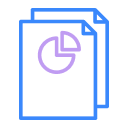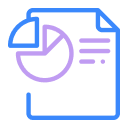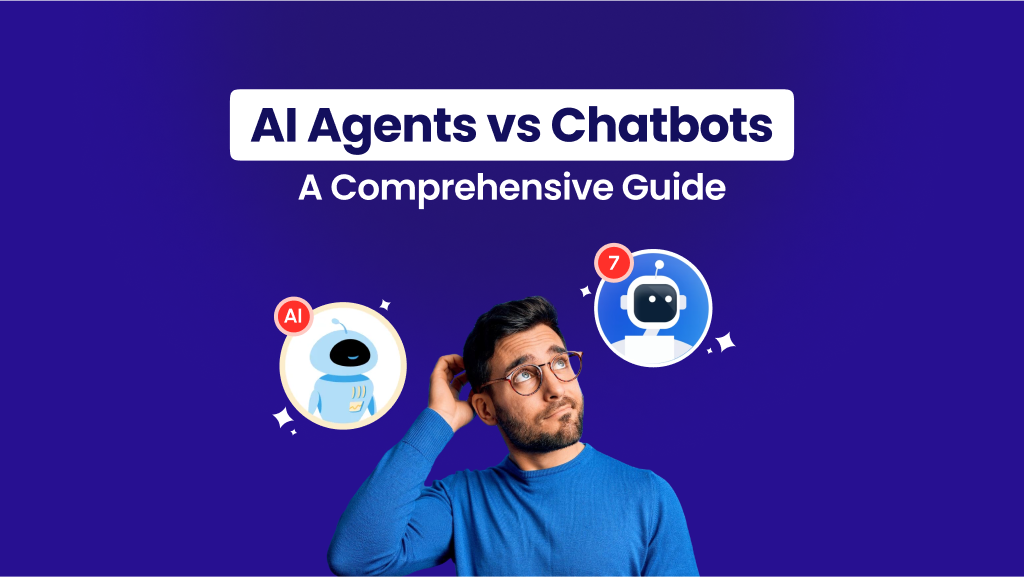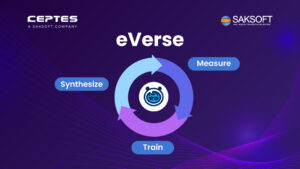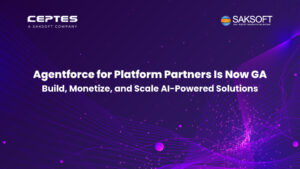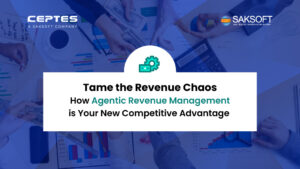81% of customers expect faster service as technology advances, and 73% expect better personalization according to a recent report from Salesforce.
The debate of AI Agents vs Chatbots has sparked numerous discussions in the tech world and for good reason. Businesses are increasingly adopting AI-driven solutions to streamline customer service, enhance engagement, and improve operational efficiency. However, understanding the difference between AI agents and chatbots is crucial to leveraging the right tool for your needs.
In this blog, we’ll explore the nuanced differences between these technologies, with a special focus on Salesforce AI agents and their potential impact. Whether you’re a tech enthusiast, a business owner, or a curious learner, this guide will break down everything you need to know about AI agents and chatbots.
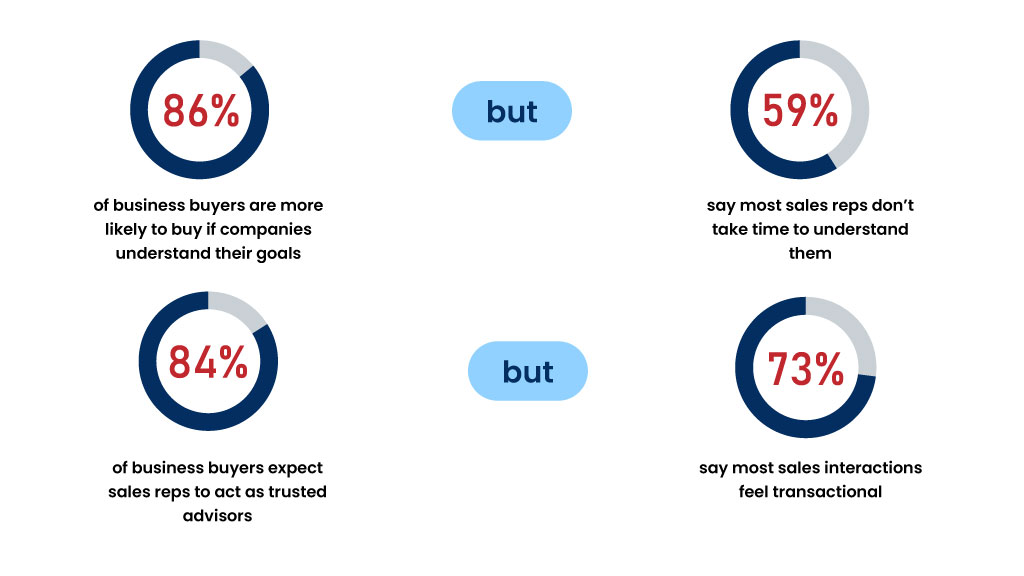
What Are AI Chatbots?
“The conversational flow itself, in traditional bots, is built in a very declarative and pre-defined manner. It doesn’t give you the full natural conversational experience,”
-Abhi Rathna, a product management director on the Salesforce AI team.
AI chatbots are software applications designed to simulate human-like conversations. They rely on predefined scripts, decision trees, predefined rules, NLP, and sometimes machine learning to interact with users. Even though chatbots also have a conversational ai interface, they don’t understand the natural language as well as the AI agents.
Chatbots are typically used to answer frequently asked questions, schedule appointments, or assist with basic troubleshooting.
Common Features of AI Chatbots
Did you know? Over 80% of businesses plan to use some form of chatbot by 2025 (Source: Gartner). With such a huge number of businesses trying to get hold of the bots, it is important to understand the common features of the AI Chatbots. We have listed a few below:
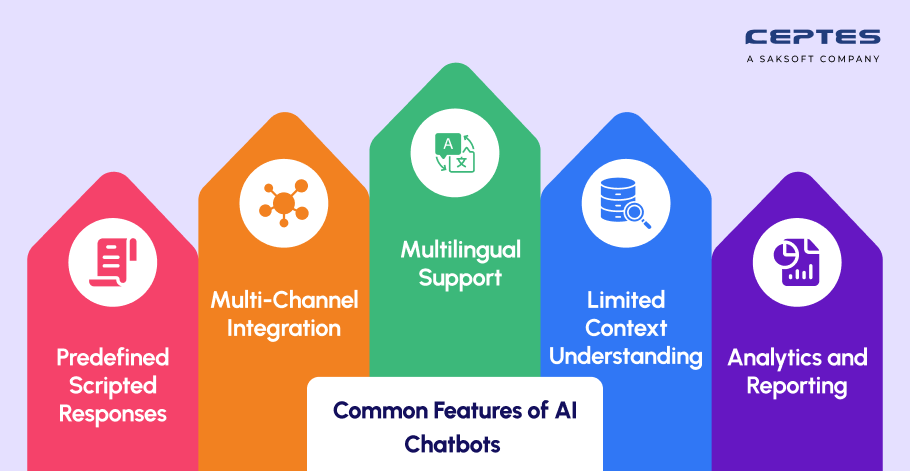
1. Predefined Scripted Responses:
Many chatbots rely on predefined scripts for handling common inquiries. These scripts guide the chatbot’s responses to provide users with consistent and accurate information about specific topics, like FAQs, product details, or customer service inquiries.
2. Multi-channel Integration:
AI chatbots can operate across multiple communication channels like websites, social media platforms (e.g., Facebook Messenger, WhatsApp), and mobile apps, ensuring a consistent user experience no matter where the interaction occurs.
3. Multilingual Support:
Many AI support chatbots are equipped to handle multiple languages, allowing them to serve a global audience and interact with users in their preferred language.
4. Limited Context Understanding:
The AI chatbots excel at straightforward tasks but often struggle with complex queries.
5. Analytics and Reporting:
These come with analytics features that track and report key performance metrics, such as user satisfaction, engagement rates, and common queries. These insights help businesses optimize their chatbot performance and improve customer service.
Popular Use Cases for Chatbots
- Customer support for FAQs
- E-commerce recommendations
- Appointment scheduling
What Are AI Agents?
AI agents, also called autonomous agents, on the other hand, are more advanced and dynamic. Unlike chatbots, they leverage Artificial Intelligence (AI), Machine Learning (ML), and deep contextual understanding to perform a broader range of tasks. AI agents are designed to mimic human decision-making, enabling them to handle more complex scenarios.
Typically built over LLMs and trained on vast amounts of data, they are able to engage in more sophisticated and context-sensitive interactions. Additionally, for a company to produce personalized results or discover valuable business insights, an agent can be integrated with your specific business data—such as structured data from spreadsheets as well as unstructured data from sources like emails, chats, etc.
Key Features of AI Agents
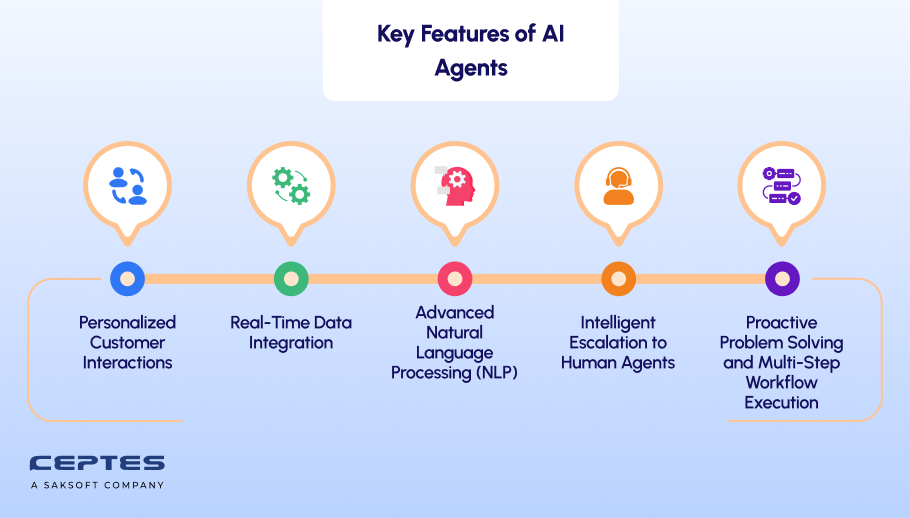
1. Personalized Customer Interactions:
Agentforce AI agents can tailor interactions based on customer data and behavior, providing a more personalized experience. They use insights from CRM data to adapt their responses, improving customer satisfaction and engagement.
2. Real-Time Data Integration:
Agents can integrate with real-time business data, including customer history, sales data, and inventory levels. This integration helps provide agents with up-to-date insights and enables them to make more informed decisions in customer interactions.
3. Advanced Natural Language Processing (NLP):
The AI agents use NLP to understand and respond to customer queries in a natural, human-like manner. This allows them to handle more complex, context-aware conversations, improving user experience.
4. Intelligent Escalation to Human Agents:
When the AI agent encounters a situation beyond its capabilities, it can seamlessly escalate the issue to a human agent. This handover process ensures that customers receive the best support for more complex issues.
5. Proactive Problem Solving and Multi-Step Workflow Execution:
AI agents can anticipate user needs and provide tailored solutions. Additionally, they can handle complex queries and perform actions across multiple systems.
Types of AI Agents
- Virtual Assistants: Examples include Salesforce Agentforce and Amazon Alexa.
- Autonomous Agents: Operate independently to make decisions without human intervention.
- Task-Specific Agents: Focused on executing specific tasks, like processing invoices.
Fun fact! By 2030, AI agents are expected to handle over 85% of customer interactions without human support (Source: Forrester).
AI Agents vs Chatbots: Key Differences
| Feature | AI Chatbots | AI Agents |
|---|---|---|
| Complexity | Handles Basic Queries | Handles Complex Workflows |
| Learning Ability | Limited to pre-programmed scripts | Uses ML to learn and improve |
| Proactivity | Reactive | Proactive |
| Integration | Simple integration with platforms | Deep integration with multiple platforms |
| Context awareness | Limited | High |
The Salesforce Edge: AI Agents and Chatbots
Salesforce has been a pioneer in AI-driven solutions for customer service. Their offerings include both AI-powered chatbots and advanced AI agents, providing businesses with versatile tools to meet their needs.
Salesforce Chatbots
Salesforce’s chatbot assistant, powered by Einstein AI, is perfect for businesses looking for scalable, efficient customer interaction. These chatbots:
- Handle routine queries
- Automate ticket creation
- Integrate seamlessly with Salesforce CRM
Salesforce AI Agents
Agentforce takes it a step further with intelligent AI agents. These agents:
- Provide personalized responses based on user data.
- Automate complex workflows, such as troubleshooting.
- Offer deep insights through predictive analytics.
- Salesforce reports that businesses using Agentforce agents have seen a 30% reduction in case resolution time.
Why the Distinction Matters
When to Choose an AI Chatbot and an AI Agent
The answer to this question is, that it totally depends on the problem that you are trying to solve! Choosing between an AI chatbot and an AI agent depends on the complexity of the tasks and the level of interaction required. AI chatbots are best suited for simple, rule-based interactions, such as answering frequently asked questions or handling basic customer service inquiries. They excel in providing quick responses and automating routine tasks. On the other hand, AI agents are designed to handle more complex tasks, including personalized recommendations, multi-step processes, and decision-making. AI agents often involve advanced machine learning algorithms, allowing them to adapt and learn from interactions, providing a more dynamic and context-aware experience. If the use case requires deeper understanding, problem-solving, and more human-like engagement, an AI agent is the better choice.
Real-World Examples
AI Chatbots
Customer Support Automation:
Many companies use AI chatbots like Drift or Zendesk Chat to automate customer service interactions. These chatbots handle initial customer inquiries, provide product information, guide users through troubleshooting steps, and even route customers to human agents if necessary. They can also track customer interactions, creating a seamless experience for follow-up.
E-commerce and Product Recommendations:
Retail brands like H&M use AI chatbots to help customers navigate their online stores. Chatbots provide personalized product recommendations based on user preferences and browsing history, making the shopping experience more intuitive and increasing conversion rates.
Healthcare Guidance
AI chatbots like Babylon Health provide users with medical advice based on symptoms they describe. While they cannot replace professional healthcare, these chatbots give users initial advice and recommend when to seek medical attention, making healthcare more accessible and reducing the burden on medical professionals.
Lead Qualification and Engagement
Companies use chatbots like Intercom for lead generation and qualification. The bot interacts with website visitors, asks qualifying questions, and directs the leads to the appropriate sales teams or resources based on their responses, speeding up the sales process.
AI Agents
Sales and Customer Service Automation
Businesses that use Salesforce’s Agentforce benefit from its advanced automation capabilities, where agents can provide a personalized experience to customers while reducing the workload of routine tasks. For instance, in call centers, Agentforce can guide agents through the sales process, offer real-time customer data, and suggest appropriate responses, helping agents close deals or resolve issues more efficiently.
Insurance Claims Processing
Insurance companies leverage Salesforce Agentforce to support their agents in managing customer claims. The AI agent guides agents through claims workflows, suggests next steps based on case data, and helps speed up the process by automating data entry and document retrieval.
Field Service Management:
Companies use Salesforce Agentforce in their field service teams. The AI agent assists field agents by providing real-time updates on service requests, customer history, and inventory data. It also helps optimize the scheduling of service visits based on location and priority, leading to faster response times and better customer satisfaction.
Sales Coaching and Performance Insights:
Financial institutions use Salesforce Agentforce to assist sales teams with performance insights and coaching. The AI agent analyzes sales data, tracks performance against goals, and provides personalized tips and coaching for each agent to improve their productivity and success rates.
In these use cases, AI chatbots are more focused on handling specific, often repetitive tasks, while Salesforce Agentforce agents serve a more dynamic, integrative role in sales, customer service, and field operations, offering real-time insights and process automation.
The Future of Chatbots and AI Agents
As AI technology evolves, the line between chatbots and AI agents may blur. However, businesses must continue to assess their specific needs to adopt the most effective solutions.
Predictions:

AI-powered chatbot assistants will coexist with AI agents, forming hybrid systems that enhance customer experiences.
Wrap-Up
The “AI Agents vs Chatbots” debate isn’t about which is better but about understanding their unique capabilities and applications. While chatbots are excellent for straightforward interactions, AI agents bring advanced intelligence and flexibility to the table.
Salesforce’s robust ecosystem of AI-powered chatbot assistants and sophisticated AI agents exemplifies how these technologies can coexist to deliver superior customer experiences.
If you’re looking to transform your operations, start by identifying your business’s needs and exploring solutions like Agentforce. The future is here, and it’s powered by AI.
Know more about it all by contacting us here and scheduling an appointment with us!
FAQ:
1. What’s the primary difference between AI chatbots and AI agents?
AI chatbots handle predefined, rule-based interactions like answering FAQs, while AI agents leverage machine learning and contextual understanding to manage complex tasks and decision-making.
2. How do AI agents enhance customer service compared to chatbots?
3. When should a business choose chatbots over AI agents?
4. What are some popular use cases for AI chatbots?
5. How does Salesforce’s Agentforce differ from traditional chatbots?

Nilamani Das
Nilamani is a thought leader who champions the integration of AI, Data, CRM and Trust to craft impactful marketing strategies. He carries 25+ years of expertise in the technology industry with expertise in Go-to-Market Strategy, Marketing, Digital Transformation, Vision Development and Business Innovation.









